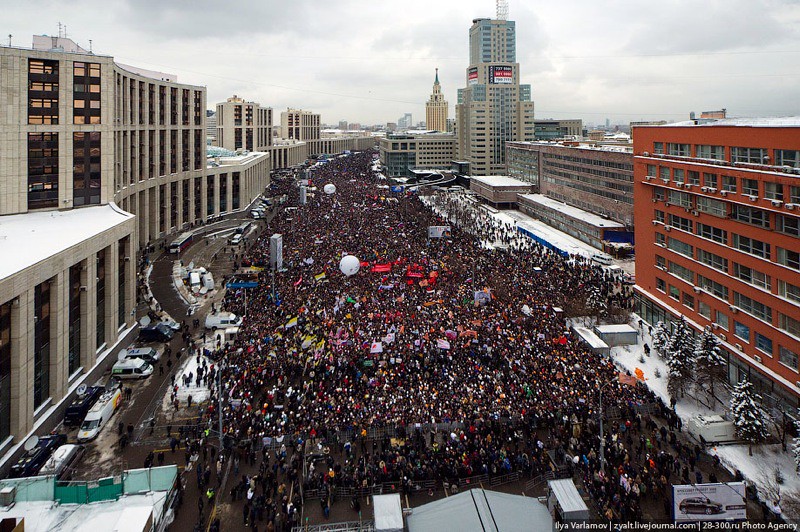The Protests in Russia
August 13, 2019 | Expert Insights

Background
Muscovites have taken to the street in droves. Protests broke out over the expulsion of individual candidates including Lyubov Sobol, one of the city council candidates and the spearhead of the protestors in the forthcoming elections. These protests have given Russians a window to vent their anger at problems that have been plaguing the country for years -such as authoritarian politics, Russia’s geopolitical isolation, negligible economic growth, heavy corruption and the absence of a political alternative.
Over fifty thousand protesters gathered on the boulevards and streets around Kremlin. Although city elections do not usually make a difference to national politics, the current pushback is primarily about necessities like food and shelter, that have become extremely expensive; and employment rates having decreased, with many small industries shutting shop.
The Russian riot police have responded with violence to the largely peaceful protests. Lyubov Subol, one of the disqualified candidates, was arrested before she could reach the venue of the protest. Opposition leader Alexei Navalny, a seasoned critic of President Putin, was jailed for 30 days. Navalny was hospitalized briefly when he fell ill in jail, with doctors suspecting foul play. Putin, who recently celebrated twenty years in power, has yet to release an official statement on the protests.
Analysis
Political protests are not uncommon in Russia, but they had subsided in recent years under the wave of intense patriotism that had swept the country upon the annexation of Crimea. Putin’s aggressive foreign policy, that increased Russia’s power abroad had also served well to pacify public opinion domestically. This current demonstration was billed as an act of defiance against the country’s increasingly repressive law enforcement agencies, who have responded to peaceful protests over the past four weeks with truncheon beatings and large-scale arrests.
Former Finance Minister Alexei Kudrin, currently Chair of Russia’s Accounts Chamber, has cautioned that the country risks an “explosion” of protests caused by declining living standards and widespread poverty.
Kudrin is widely viewed as a torchbearer for the group of liberal technocrats working within Russian President Vladimir Putin’s system, and his words carry significant weight among liberal-minded observers.
Not surprisingly, private consumption has been weak. Last year, when the government implemented drastic pension reforms, which, among other things, raised the retirement age by five years - popular protests that swept through the country were formidable enough to force Putin not only to defend the policy publicly, but also to make some concessions.
Now, it seems that Russians are not entirely convinced by Putin’s arguments, and public trust in the government has fallen. Although the protests against the pension reforms faded, partly with the arrests of protestors by government forces, voters punished Putin’s United Russia party in September’s regional elections, and Putin’s approval rating, which had previously hovered around 80 per cent, has fallen to 64-68 per cent since October 2018.
Putin is now roughly as popular now as he was before the Annexation of Crimea, and the surge in nationalist rhetoric that accompanied it. Five years later, this tactic seems unlikely to work again. Russians no longer seem to be persuaded by anti-Western discourse and militarist rhetoric.
Sobol and other individual candidates were denied a ticket to stand for elections citing the reason that they did not get enough signatures in favour of their candidature. This has been criticized as a ploy to ensure that opposition-minded candidates are blocked from standing for elections.
It is important to note that most protesters do not have one specific demand - rather, there are multiple issues being flagged. While this goes to show that there is widespread disapproval among the public, authorities seem to think that the lack of a common cause will result in the protests dying down soon.
What stands out in these protests is the sudden and strong use of force by Russian riot police. In the past, the police focused more on arresting the protesters, rather than beating them up in the streets. This time, however, they were taken aback by the large number of protesters that actually showed up. Anger at the violent treatment meted out by the police has only fuelled more protest, with rappers and musicians who are hugely popular, joining in.
Opposition leaders are taking this opportunity to loosen Putin’s totalitarian control of the state. They are urging more people to protest and asking protesters to boycott the elections if their demands are not met.
Assessment
- The Putin regime responding with such aggressive tactics is an indication of its nervousness at a time of widespread discontent over the state of Russia’s economy.
- Social unrest in Russia could be much more than economic frustration. It could be more fundamental: the struggle for dignity.
- Boycotting elections if the administration does not concede to demands, maybe an unwise move on the part of the Opposition. If the protesters do not vote to show support for the opposition candidates, they will be forfeiting their votes to the majority candidates, as the ballot is based on a simple majority.
- With the United Russia Party and Putin losing some credibility, the crowds of people that have gathered on the streets in Moscow are likely to trigger similar protests across the country.
- Russia will still have one major concern: Regionalisation. Russia’s economy is highly regionalized, over a fifth of its wealth is generated in Moscow and its surrounding areas. The central government keeps Russia together by redistributing wealth to the interior. They see the situation worsening over the course of a generation, and possibly reaching a tipping point within 20 years.
Image Courtesy: flickr.com








Comments